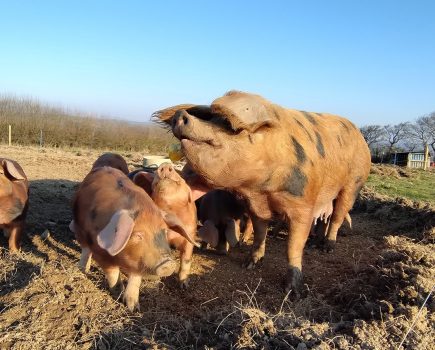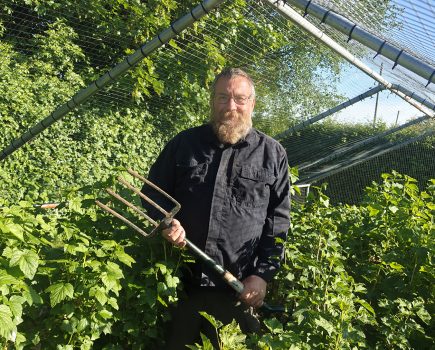Many smallholders give a home to rescue animals. Simon Dawson is one of them, and here he debunks some myths, looks at the practical, financial and emotional implications and poses the question: What’s in it for me?
With tens of thousands of animals looking for a second chance at a happy home in the UK, it’s no wonder smallholders are taking on increasing numbers of rescue animals. From feral cats to working dogs, ex-bat chickens to horses destined for the dog-food chain, more and more of us are giving up a corner of a barn and a considerable chunk of our heart to these mites. But just how practical is it, and are we simply taking on someone else’s unwanted problem?
And here’s the first myth that needs debunking: Rescue animals are someone else’s unwanted problem.
Of course they’re not. People are forced into giving up their animals for a whole host of reasons, many of which are completely out of their control. There might be a marriage breakdown, job redundancy or ill heath; any number of things can affect our ability to look after the animals in our care. These animals on the whole are in good condition and loved to within an inch of their lives, but sometimes life throws out a nasty surprise and, however painful the decision, often there’s little choice other than to give the animals up.
For these animals it is simply a case of re-homing. I took a call from a rescue centre asking if I could take on a ‘micro’ pig that was living in a house in a residential street in the middle of town, and the owners were shocked to discover that the tiny, weenie, cute-as-can-be piglet had grown into a stomping, bad tempered lump of a normal size pig that was living in their back room, taking up all the sofa and demanding daytime TV!
Second myth to be debunked: It’s only cats, dogs and chickens that need re-homing.
Not at all. I spoke to Diana Lewis at the North Devon Animal Ambulance, who told me: “We get everything, and I mean, everything! Snakes and lizards are not uncommon at all. Chickens, ducks, geese, turkeys, pigs, sheep, goats, horses, you name it, we’ve taken it in and found it a home.”
So with farm animals up for adoption, is it a practical alternative for smallholders to approach rescue centres when they need livestock?
Although the answer is a resounding yes, it is a little more complicated. Timing is one issue. Rescue centres can only re-home the animals they have, and if you’re looking for a particular breed, or strain within a breed, then it’s unlikely a rescue centre can help. However, if you can generalise and think, ‘I want some chickens,’ as opposed to, ‘I want Light Sussex,’ then you’re much more likely to get a result.
Diana Lewis explains: “If you register an interest with us [rescue centre] then when we get something that you might be interested in, we will contact you.”
So it’s a longer term plan, like a wish list. I’ve got 20 acres on Exmoor, just did the maths and worked out that over 50 per cent of my animals are from rescue centres. I started off thinking, Oh, wouldn’t it be nice to give something back and take on a recue cat? That’s how it starts. With a little black Morris cat. Then you think, one more pig wouldn’t hurt… one more goat… chickens? Why not? Would one more horse make all that difference…? A few more ducks maybe… geese…
They just appear, and then keep appearing. Then one morning you wake up and think, I am an overflow rescue centre!
Would I change it? Not for the world. Would I recommend it? Absolutely! Mind you, some of them should have gone ages ago, like the feral goat; especially the goat, who’s threatened daily, but I can never quite bring myself to book her in, because, well, when you take on a rescue animal you have to keep them, right? That’s part of the deal, isn’t it? You keep them forever.
No, no, no – unless you’re stupid like me. Debunking myth number three: Rescuing farm animals is the same as rescuing domestic animals, in as much as you have to give them a home for the length of their natural lives.
Diana Lewis again: “We are realists. Of course in a perfect world we’d like to hand over baby lambs or weaner piglets and know they’re going to live until old age, but farming and smallholding isn’t like that. We understand this. All we can ask is that the animal is happy and well looked after, and that its end is without fear or pain, which is no more than I can ask for myself.”
Is it expansive to take on a rescue animal?
Most rescue centres, if not all, will vet check animals before they hand them over, so at least you know you’re getting them in tip-top shape. As for charging, all centres are different. Some have set fees, some ask for a donation. Generally speaking taking on a rescue animal is cheaper than buying from a breeder, and if it’s a specialist animal where the centre approaches you and asks you if you have space to take it on, it can be considerably cheaper.
So it’s win, win, right? Kind of. Look, I’m not going to lie to you; sometimes, because of their history, their background, the animals can be a little more… there’s not really a delicate way to say this… sometimes rescue animals can be a bit more… loony – dysfunctional might be a better word. Emotionally dysfunctional.
For example, Senorita, the micro-pig-who-isn’t-a-micro-pig I took on, has absolutely no idea she is a pig at all. She was brought up in a house with dogs and children and daytime TV. Put her in a pen with another pig and she freaks! The feral goat’s a bit wonky in the upstairs department too. Let’s face it, they come with issues. Nothing bad, nothing dangerous, just, you know, issues. But then you would expect that. Cause and effect – everything that happens to an animal will make a difference to its character, and of course it can’t tell us what it’s been though, so it shows it through its actions. You just cut them a little more slack than you might otherwise.
It all sounds good, but what’s in it for me?
When an ex-battery hen takes her first ever step on grass; when a day old goat found huddled next to her dead mum suckles from a bottle you give her; when a horse that was going for dog-meat answers you with a whinny in the field when you call its name; when sheep and lambs give you loving head butts and knock the bucket out of your hand (yes I know I’m pushing it with sheep, but stay with me on this…); when a feral cat curls up in the straw after a night of pest control duties; when a pig looks in disgust at her quarters because there’s no television; that, my friend, is what’s in it for us.
Animal rescue centres are everywhere up and down the UK. Go online to find the nearest one to you.
* Simon Dawson runs courses at his smallholding on Exmoor. See www.hiddenvalleypigs.co.uk He is also author of Pigs in Clover: Or How I Accidentally Fell in Love with the Good Life







